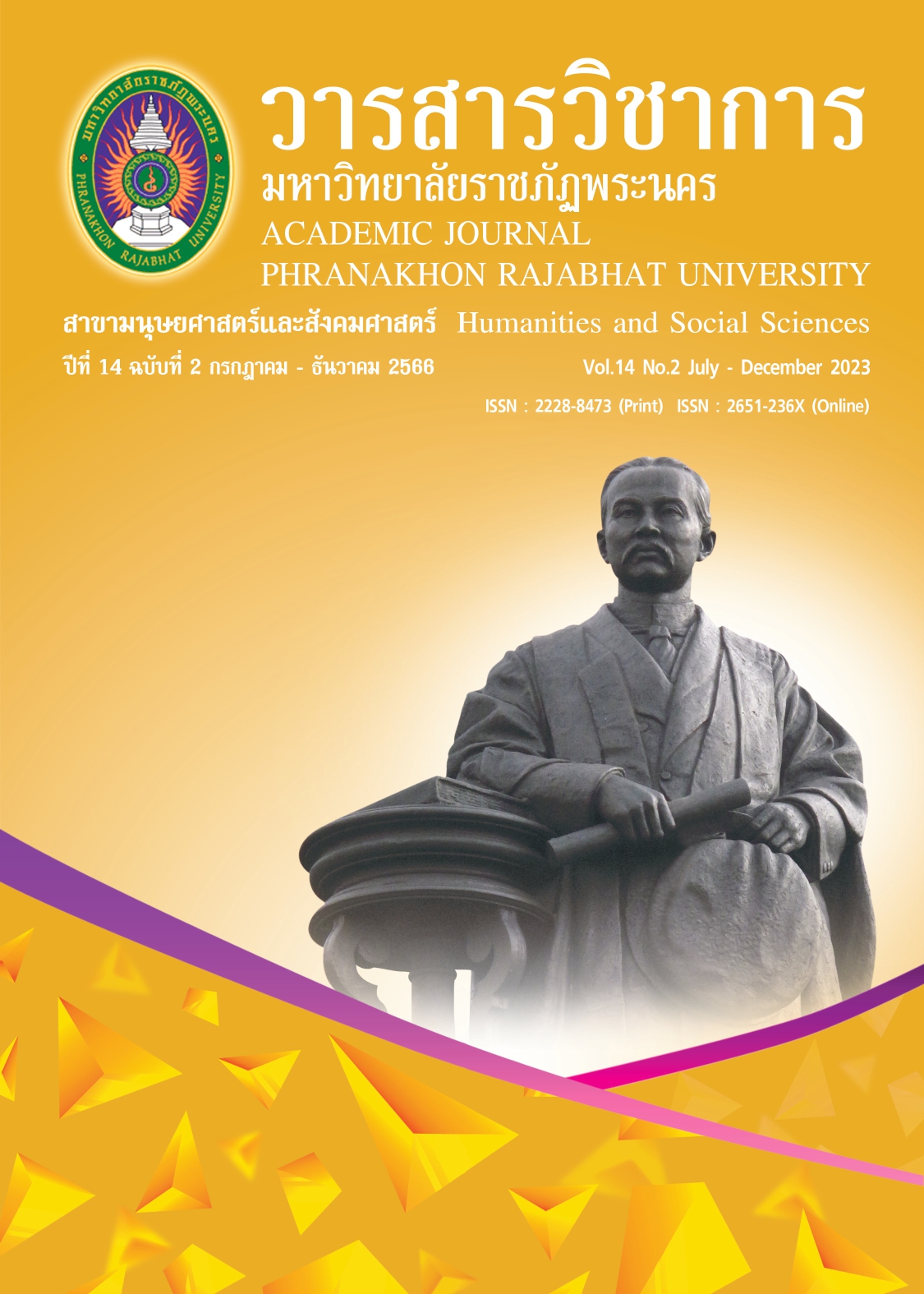THE INFLUENCE OF SOCIAL ENVIRONMENTAL FACTORS ON BEHAVIORAL ATTITUDES TOWARDS IMITATING UNETHICAL BUREAUCRATIC PRACTICES AMONG GOVERNMENT-ORIENTED STUDENTS: A CASE STUDY OF BANSOMDEJCHAOPRAYA RAJABHAT UNIVERSITY STUDENTS
Keywords:
Imitation Behavior, Bureaucratic Practices, Social Environmenttal factorsAbstract
The problem of corruption within the bureaucratic system has long been prevalent and common among certain public officials. This issue has led to severe damage to the country. One contributing factor to their corrupt behavior arises from their perception of the existence of corruption problems within bureaucratic systems since their early years. Frequent exposure to various news involving corrupt behaviors within the bureaucratic system by the mass media has also familiarized them with those practices among public officials in different public organizations to varying extents. Another significant reason concerns the social perception of people's behavior, including chaotic behavior, non-compliance with laws, and other social order issues. This has acquainted people in society with corrupt behaviors. Take the following behaviors as apparent examples: using influential connections to enroll kids in popular schools, violating traffic laws, and cheating in examinations, etc. These conducts will significantly serve as bad examples for the younger generation, encouraging them to adopt and follow corrupt behaviors as common practices. Consequently, future public officers may also follow these unethical traits as they have long been perceived in Thai society.
The research aimed to: 1) study the behavioral attitudes towards imitating unethical bureaucratic practices among government-oriented students, 2) study the social environmental factors that influence behavioral attitudes towards imitating unethical bureaucratic practices among government-oriented students, 3) compare behavioral attitudes towards imitating unethical bureaucratic practices among government-oriented students based on personal factors, and 4) investigate the relationship between social environmental factors and behavioral attitudes towards imitating unethical bureaucratic practices among government-oriented students. The sample consisted of 345 students, and the data collection instrument was a questionnaire. The statistical methods used for data analysis included frequency, percentage, mean, standard deviation, t-test, F-test, and multiple regression.
The research results revealed that:
- 1. The overall behavioral attitudes of students oriented towards employment as public officials imitating unethical bureaucratic practices were moderately low.
- 2. The overall social environmental factors related to unethical bureaucratic practices among students oriented towards employment as public officials were moderately low.
- 3. The comparison of behavioral attitudes towards imitating unethical bureaucratic practices among students oriented towards employment as public officials by personal factors revealed a statistically significant difference, specifically concerning the parents or guardians.
- 4. The relationship between the overall social environmental factors and behavioral attitudes towards imitating unethical bureaucratic practices among students oriented towards employment as public officials was examined. The results of the multiple regression test revealed that attitudes towards corruption, dishonest behavior in education, and motivation to resist corruption were correlated with behavioral attitudes towards imitating unethical bureaucratic practices among students oriented towards employment as public officials.
References
Chusanachote, P. (2013). Self-concept, empowerment, imitating altruistic behavior and altruistic personality of village health volunteers in Samut Prakan province. (Master of Science). Kasetsart University, Bangkok. (In Thai).
Meeros, M. (2015). The patterns of the application of good governance in the mManagement of the Provincial Administrative Organization: A case study of Prachinburi Province. (Master of Arts). Burapha University, Bangkok. (In Thai).
Namsai, A. (2019). Entertainment media exposure behavior and imitation behavior of youth in Bangkok. (Master of Communication Arts). Sripatum University, Bangkok. (In Thai).
Netiprawat, K. (2001). Acceptance of a new form of social organization according to the principles of good governance and society in government organizations: Study the case of the Office of the Permanent Secretary, Ministry of Public Health. (Master of Arts). Kasetsart University, Bangkok. (In Thai).
Phongngam, K. (2010). Local Governance : Participation and Transparency. Bangkok : Promotion of Local Administration Foundation. (In Thai).
Phongpaichit, P. (2000). Corruption and democracy. Bangkok : Political Economics Studies Center, Chulalongkorn University. (In Thai).
________. (2004). Good governance and corruption in Thai society. Bangkok : Institute of Perspectives. (In Thai).
Phungduang, K. (2017). Good governance administration and the school effectiveness under Samutsakhon Primary Educational Service Area Office. (Educational Administration). Silpakorn University, Bangkok. (In Thai).
Piriyarangsan, S. (2006). Corruption theory. (2nd ed.). Bangkok : Hand-In-Hand Press. Bangkok. (In Thai).
Potipiroon, W. & Srisuthisa-ard, A. (2020). Corruption-free bureaucracy: a viewpoint survey of government employees on whistleblowing. (Research Report). Bangkok : Thailand Science Research and Innovation (TSRI). Bangkok. (In Thai).
Priebjariyawat, W. (2000). Tyrant's guide. Bangkok : Millennium Institute. (In Thai).
Prommapun, B. (2004). The development of indicators for the evaluation of local organization personnel administration. Nonthaburi : Sukhothai Thammathirat University. (In Thai).
Techathongpitoon, P. (2017). Factors related to living behavior according to the sufficiency economy philosophy of people in the Subdistrict Administrative Organization, Bowin Subdistrict, Si Racha District, Chonburi Province. (Public Administration). Bansomdejchaopraya Rajabhat University, Bangkok. (In Thai).
Rumakom, W. (2017). Model of relational structure to cause which effect the imitation behavior of students at Muang District Phayao. (Master of Education). Chiang Rai Rajabhat University, Chiang Rai. (In Thai).
Sasuwan, R. (2017). Exposure, attitude and behavioral imitation of Korean culture by viewers in Bangkok. (Master of Arts). Thammasat University, Bangkok. (In Thai).
Suwanwela, J. (2003). Governance blind spots: The role of public organization boards. Bangkok : Chulalongkorn University Press. (In Thai).
Thairungroj, S. Phonwichai, T. Phothong, P. Watit Raktham and Chennapa, S. (2010). An assessment of the corruption situation in Thailand. (Research Report). Bangkok : Office of the National Anti-Corruption Commission. Bangkok. (In Thai).
Watcharathanapattada, P. (2020) . Factors affecting corruption in Local Administrative Organizations. Journal of politics, administration and law, 12(2), 37-54. (In Thai).
Wongwarunyoo, T. (2020). The impact of the patronage system on performing the civil servant’s Duties in Loei Province. Research and Development Journal Loei Rajabhat University, 15(54), 65-75. (In Thai).
Yamane, T. (1973). Statistics and introductory analysis. New York : Harper and Row.
Downloads
Published
How to Cite
Issue
Section
License
Copyright (c) 2023 Academic Journal Phranakhon Rajabhat University

This work is licensed under a Creative Commons Attribution-NonCommercial-NoDerivatives 4.0 International License.
"บทความวิชาการในวารสารฉบับนี้ ถือเป็นความรับผิดชอบของผู้เขียนเท่านั้น"
สงวนลิขสิทธิ์ตามพระราชบัญญัติลิขสิทธิ์




